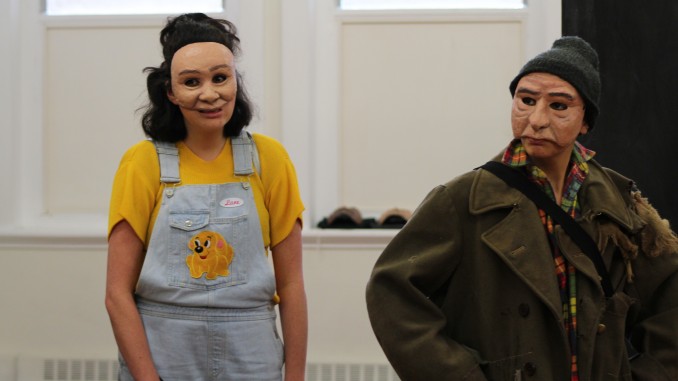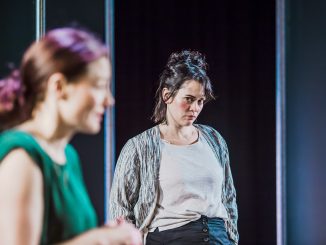
[Finding Ourselves in the Form]
Sometimes there is nothing so magical as a girl, on a stage, sitting on a rubbish bag.
With every funding cut scything away at our creative waistlines, the Arts are now in a position where every show must first justify its existence. Why do we bother to make theatre – especially under these conditions? Sitting in the captivated full house audience of Leilani, playing in Q Theatre’s Loft, watching dungaree-ed actress Irasa Siave sink fluidly onto a black rubbish sack, I know exactly why. This is the first work of Pedro Ilgenfritz’ new company, Mahuika Theatre, making self-proclaimed ‘almost Commedia Dell’arte but not quite,’ and they are delightfully professional storytellers. Our all female cast of three don nine homegrown masks, exquisitely designed by Kate Lange, to hold a series of New Zealand archetypes from different walks. We follow the tale of the loveable and ‘sad-faced’ Leilani, a young Samoan girl dumped by her boyfriend, pregnant and homeless. As I write that sentence, I am aware that our national media are fond of this story – this is well rehearsed character in our public rhetoric. This is why Leilani is such a charming and welcome antidote to the boorish and frankly incoherent narratives around street-sleeping we are usually subject to.
We are seldom treated to theatre in New Zealand that works in mask. Here the form is dominated by Indian Ink Theatre Company, and they rarely set their work in a New Zealand context. It is a brave act by Mahuika, not only in terms of form, but also the translation of a seventeenth century theatric practice to a localised context – we see the ‘straight up kiwi bloke, the Maori trickster, the Samoan sweetheart.’ This is an exciting addition to our lexicon.
The articulation of the performers is delicious – we are being educated in the nuance of character in mask, the shifting centre-of-weight, the precision of gesture, and the vitality of telling a story with only the lower half of your mouth visible (a skill the supple Aymee Kariatiana-Jones is adept at). We are captivated by the playful and optimistic Leilani, played by Irasa Siave with admirable subtlety. Siave is the only actress who maintains one character throughout, and the remaining cast have their work cut out for them to play all other eight between them, not least because costume changes backstage become an art form all of their own. The shifts are seamless. Natasha Daniel in particular delights with her diverse representations of the hunched and affable ‘Trev,’ (our unlikely hero), and the repressed and assertively challenged ‘Tim,’ who is both audience heart-throb and painfully recognisable in ourselves.
Not all characters, however, are so lucidly portrayed. The trouble with a form that self-proclaims to work in stereotypes is that the currency can be somewhat flawed. While the show seems to effortlessly rewrite the intentions, agency and circumstances of our two homeless protagonists, it does less well with providing complex characters to buttress this tale. To me, this is most striking in its representation of female characters. Sue, Aroha and Paihia are variously played as controlling, vacuous and materialistic. Daniel’s simmering, lemony representation of Aroha was physically satisfying, but her text felt double-percussive, the kind of generic ‘mean girl’ you never really meet, but we love to play. Similarly, Paihia felt like a muddied ‘type,’ in no small part due to scripted simplicity – when she directly states that her character wants “jewelry… furs…” she is at her weakest, we can find no complexity (read humanity) here, so her characters journey doesn’t quite land.
At other points, the play is lovely. Leilani is to be commended for its delicate and truthful engagement with the accident of finding oneself homeless. There is a poignancy to the moment when our heroine remarks, like that of a child playing a superhero: “I’m invisible!” This is the heart of the matter for this large cast of characters, in a situation where so many people can see another persons vulnerability, and still do nothing to help. I do think this tale can be told in less time, though my personal love for ‘Tim’ (i’d crowd fund a spinoff!) and the thumping piano ostinato keep me engaged till the final minute. In the final moments, however, just as I breath in the gravity of Leilani’s difficult fate, the director chooses to end on a punchline – I would rather have been permitted to carry its uncertainties with me out of the theatre. But the audience exhales, and so should this company. They should be proud of this engaging, fluent and entertaining new work, bringing life and dynamism to a vital conversation.
SEE ALSO: Theatreview.org.nz review by Nik Smythe and Metro Magazine review by James Wenley




Leave a Reply